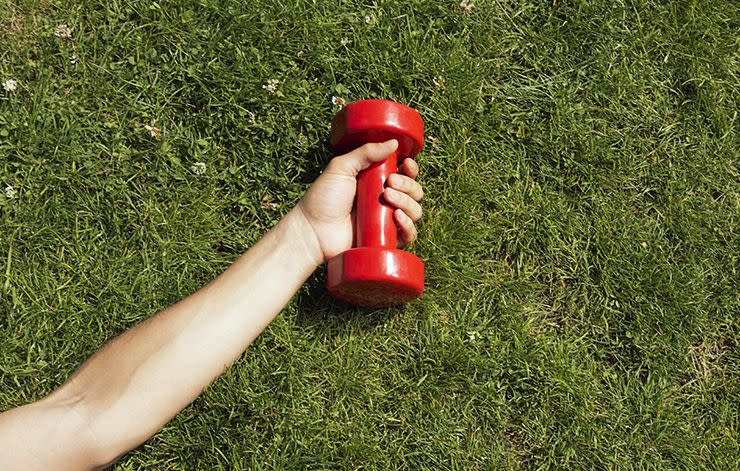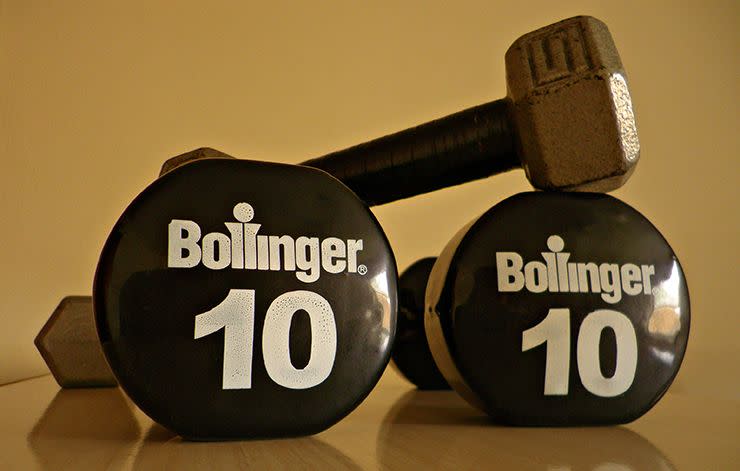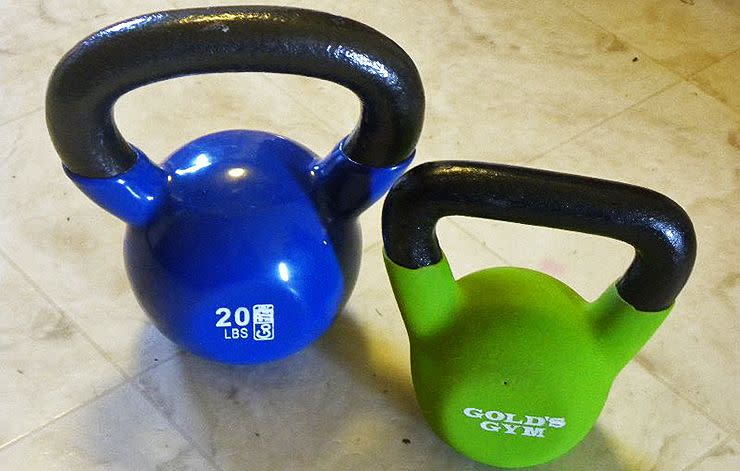By the Numbers: How Losing Weight Improves Cycling Performance

By the Numbers: How Losing Weight Improves Cycling Performance
You don’t have to ride fast to be a cyclist, but if you want to crush some speedy sections, slimming down can really help your cause.
“Any reduction in body weight can make a difference in performance, especially in events that resist ‘extra’ gravity,” says Chad Timmerman, head coach and co-founder of TrainerRoad, an online power-based training system.
RELATED: 10 Oddly Effective Weight-Loss Tips Backed By Science
Situations where gravity favors the light include sustained climbs; short, steep, grunt-inducing hills; and criteriums where you sprint out of every corner.
But how much does weight matter, exactly? We were curious, so we calculated the benefits for a few scenarios; it turns out that hauling even just a tiny bit less junk in your trunk can translate to performance increases.
For these scenarios, we’ve based our calculations on a 180-pound rider who can sustain 200 watts on climbs. You can do the calculations for yourself using BikeCalculator.com’s handy online calculator.
A quick note of caution: Cyclists (and humans in general) can only lose so much weight before their health declines. Make sure you're targeting your ideal cycling weight when considering a weight-loss program to boost your riding.
Try Bicycling's 21 Day Ride Streak Challenge for Daily Motivation!

If You Lose 5 Pounds...
The good news is that losing five pounds is a fairly attainable goal for most people that will translate to some gains—plus, your cycling kit will fit a bit better. You may not notice the weight loss on your local, low-intensity coffee ride, though. “It’s hard to say anyone would notice except perhaps for a slightly fresher Joe Cyclist,” says Timmerman.
RELATED: The Cycling Calories Burned Calculator
On a slow-burn climb, however, things will change. Say you hold 200 watts up a six-mile climb with a three-percent grade. If you weigh 180 pounds, you’d average 11.46mph. If you weigh 175 pounds, you’d go 11.65mph. At the top of the climb, you’d have saved 30 seconds. That might not seem like a lot, but if you’ve ever watched someone slowly roll away from you, you know what a difference even a few seconds can make.
On a steep pitch, things get even more pronounced. Again, let’s say you can hold 200 watts up a two-mile climb with an average grade of 10 percent (ouch!). At 180 pounds, you’d be able to post an average speed of 4.5mph. At 176 pounds, you could average 4.63mph. At the top of the hill, you would have saved just under 40 seconds (38.4 seconds, to be exact).

If You Lose 10 Pounds...
Once you lose 10 pounds (just under six percent of your total weight, if you're our 180-pound Joe Cyclist), you not only start looking leaner but also start experiencing some real health benefits. One study of overweight and obese individuals published in Diabetes Care showed that dropping five to 10 percent of body weight corresponded to significant drops in systolic blood pressure and blood sugar, and improved HDL ‘good’ cholesterol, all of which lower risk of cardiovascular disease.
RELATED: 10 Ways to Lose Weight Without Even Trying
On a long, slow climb, you’ll see a pretty big benefit after losing 10 pounds. Let’s go back to that example of pumping out 200 watts on six-mile climb with a three-percent grade. While your old self would have averaged 11.46mph on the long, slow slog, your lighter self will spin up it at 11.84mph—at the top, you’ll have saved a whole minute.
For a short, steep climb, you’ll steal even more time. At 180 pounds, you’d plug away on a two mile-long, 10 percent-grade climb at 4.5mph. At 170 pounds, those same 200 watts would generate a speed of 4.74 miles per hour. That may still not seem like a lot, but think: at the end of the climb you’d be a minute and twenty seconds ahead of your former self—and that’s over the course of only two miles!

If You Lose 20 Pounds...
At this point, you’re definitely going to have to buy new bib shorts. Your friends are also going to be asking you for weight-loss tips.
There is a catch with losing 20 pounds or more, though: Losing this much weight is only good for cycling performance if you actively work to maintain strength as you slim down.
RELATED: How to Lose Weight and Still Ride Strong
Eric Sternlicht, PhD, a professor of kinesiology at Chapman University, says that there’s a point of diminishing returns for most cyclists, when weight loss translates to lower power. “You need to ask, where’s my sweet spot? Where do I have my best power-to-weight ratio?” he says. If you notice power slipping as the scale ticks downward, it may be time to stop dieting.
Furthermore, “anytime power declines, numerous other undesirable training outcomes begin to trickle into the mix,” adds Timmerman. He says things like altered hormone production, reduced strength, and neuromuscular impacts are all likely to accompany weight loss beyond a healthy point.
But, if you truly needed to lose 20 pounds and did so in a safe way, congratulations! You’re going to see big improvements, especially going uphill. Since you so carefully worked to maintain your strength, we’re going to continue using the 200-watt average for these scenarios. On that three-percent grade, you’re going to be waiting at the top for your friends for nearly two minutes longer than you normally would have (1:57, to be exact), giving you plenty of time for heart-rate recovery. You’ll also average 12.22mph, versus the 11.46mph you would have averaged at 180 pounds.
Going up a two mile-long, 10-percent grade will never feel easy, but it will be a lot easier with your lighter frame. What would have taken you well over 26 minutes at 180 pounds will take you just over 24 minutes. You’ll save a grand total of two minutes and 35 seconds, and you’ll average 4.99mph versus the 4.51mph of your former self.
Cycling favors good power-to-weight ratios, but by how much? We calculated exactly how weight loss can boost your riding performance.